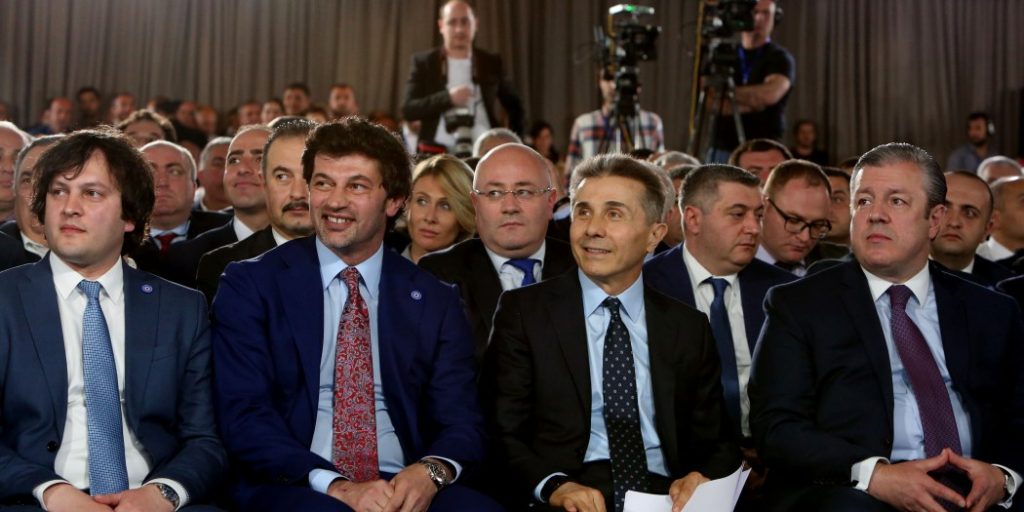Former Prime Minister Bidzina Ivanishvili, who established the Georgian Dream-Democratic Georgia (GDDG) party in 2012, was endorsed as the GDDG chairman at the ruling party congress today.
The congress, attended by government officials, lawmakers and regional delegates, was convened earlier this month, shortly after the ex-PM confirmed that he would return to the helm of his party.
In his 24-minute address today, Bidzina Ivanishvili recounted the country’s progress under the Georgian Dream government and clarified his reasons for returning to party politics.
Georgian Dream Achievements
The former Prime Minister stressed in his remarks that he was proud of the “fundamental victories” that the GD government had achieved “in a very short period of time, in just less than six years.”
“For me, personally, and I am sure, for the vast majority of Georgians, the most important [success] was the democratic transformation that the country has gone through in recent years,” he said.
“Today, we have a government that came to power not through rigging elections, threatening or committing violence, but a government that was elected by the people,” Ivanishvili added.
The ex-PM then stressed that private property rights “are fully protected and inviolable today,” unlike under the UNM government, when the property rights “were trampled down and nonexistent.”
According to Ivanishvili, the country experienced “tangible progress” in terms of judicial independence and de-politicization of the police. “Radical breakthrough” was achieved with respect to rights protection in prisons.
Bidzina Ivanishvili touched upon the constitutional reform as well, stressing the country adopted a constitution “that is based on the principle of rule by the people and that meets the European standards.”
“Notable progress” has been achieved in foreign affairs, in the words of Ivanishvili.
“Never in the history has Georgia been so close to Europe and NATO as it is today,” he noted, adding that the country’s relations with its strategic ally – the United States – “strengthened and deepened significantly.”
The ex-PM also noted that the government managed to “partially deescalate” its relations with Russia. “We hope that through the help of our international partners, we will manage to start listening to each other and engaging into dialogue, which will gradually open up opportunities for achieving our country’s objectives.”
Reasons for Return
Bidzina Ivanishvili spoke at length on reasons for his comeback, saying the decision was “rather difficult,” and that he decided so “neither because of the party and the government,” nor his “personal interests.”
“Just like in October 2011 [when I entered politics], the objective today is the same: the wellbeing and better future of Georgia, the people of Georgia and every Georgian family,” the former Prime Minister stated.
He then stressed that the country was facing three “very important challenges,” that pushed him to return to party politics.
The first, according to Bidzina Ivanishvili, “is the objectively unfavorable socio-economic environment, as well as the permanent attempts to artificially exaggerate the difficult situation.”
Here, the ex-Prime Minister noted that Georgia had failed to overcome the economic hardships that it had inherited from the early years of its independence: “unemployment, insufficient salaries and pensions remain a severe problem, cost of living is getting more expensive.”
He then accused “the politically-influenced television channels, politicians engaged in the machine of lies and the so called experts,” of instilling “the atmosphere of hopelessness and fear,” and of trying to convince the people that the country is “on the verge of collapse.”
“Of course, these claims lack reason, but the vulnerable and the poor fall for these skilfully camouflaged lies,” Ivanishvili added, stressing that the government’s response to this “unprecedented information attack on people’s consciousness,” was not adequate.
The second challenge, in the words of Ivanishvili, relates to the opposition’s “extremely destructive attitudes.”
“They are competing with one another not in presenting better programs, but in instilling desperation and hopelessness in the country, since they know that pessimism is their only leverage that they can use for taking revenge on the Georgian democracy,” he added.
The third reason that pushed him to return to party politics, according to Ivanishvili, “is, albeit minimal, but nonetheless completely unnecessary, unfounded and detrimental misunderstanding within the Georgian Dream.”
“I had a feeling that the Georgian Dream-Democratic Georgia, the integrity of which lies in its ties with the people, would distance itself from its constituents, if these processes deepened, and this is exactly why I decided to come back,” he added.
This post is also available in: ქართული (Georgian) Русский (Russian)

